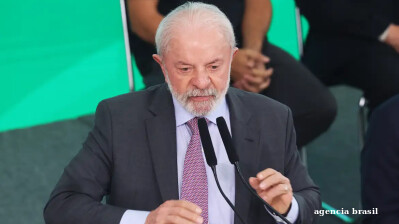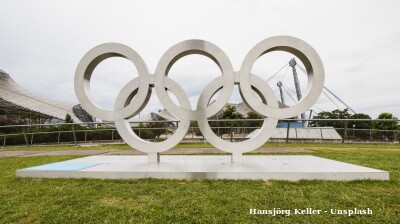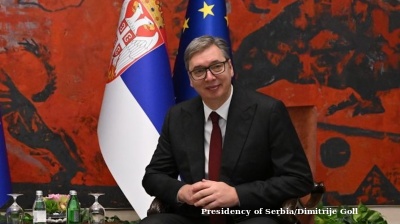Austria has blocked proposed sanctions on bank loans to Belarus to protect a branch of Raiffeisen International that has been operating in Minsk for years.
The EU has put forward a sweeping package of sanctions on Belarus in retaliation for the forced landing of a commercial Ryanair flight over Belarusian airspace on May 23 that led to the arrest of Roman Protasevich, a top opposition blogger.
In some of the harshest sanctions every proposed on an Eastern European country, Brussels has been considering penalising Belarus’ biggest cash cows, including the exports of potash and its refined oil products.
Amongst the sanctions is a potential ban on lending to Belarusian banks, but the move has been blocked by Austria. Leading Austrian banking group Raiffeisen International has had a joint venture in Belarus for years and is a co-investor into Priorbank, a leading privately owned bank that has extensive business with the state-owned companies.
As Belarus’ economy is highly export-orientated, Priorbank has been able to carve out an important niche for itself working with trade arrangements as well as offering traditional banking services.
The Austrian government has blocked the sanctions to protect Priorbank’s business. Austrian diplomats upheld their objections in the latest round of talks in the EU Council in Brussels on June 17.
"They [the Austrians] want to water down the language to such an extent that the banking sanctions have almost no real impact," a diplomat from another EU country told EUobserver.
"It's a clear case of putting financial interests before principles," a second diplomat added.
"It's 26 [member states] against one, so I think they'll have to capitulate in the end," a third EU source told EUobserver.
When asked about the case by press in Brussels on Thursday, the Austrian finance minister, Gernot Blümel, claimed to know nothing about it.
"Sanctions should also cover the financial sector. Austria advocates in this respect a ban on securities trading and money-market instruments, which would represent a drastic measure," the Austrian foreign ministry said in a statement to this website, as cited by EUobserver.
"It is of high importance for Austria that financial sanctions do not target the population of Belarus," it added.
"It is in our common interest that Belarus is not pushed even further into the sphere of influence of Russia," it said.
Priorbank maintains tight ties with Belarus' President Alexander Lukashenko’s government, as most of the top state-owned enterprises (SOEs) are amongst its clients. In addition, the head of Belarus' top oil firm, Belarusneft CEO Alexander Lyakov, sits on Priorbank's board, in just one of several personal connections to the regime.
Unanimous EU voting
This is not the first time the EU sanction efforts have been stymied by EU business interests in Eastern Europe. Earlier this year, EU efforts to impose sanctions on Russia following the poisoning of jailed anti-corruption activist and opposition politician Alexei Navalny in January with the military grade nerve agent Novichok were blocked by Cyprus, which has extensive banking business with Russia. Nicosia eventually caved into the pressure of the other members and the sanctions went through, but they remained symbolic.
EU senior members are clearly becoming frustrated with the need to get the unanimous agreement of all 27 member states to impose any punitive measures on countries like Russia and Belarus, and even more relevant, on other EU members.
German Foreign Minister Heiko Maas called last week for an end to the requirement that all the members have to sign off on any decision and the rules be changed so a majority vote is sufficient.
"We can no longer be held hostage by those who paralyse European foreign policy through their vetoes," Maas said, accusing those doing so of "playing with Europe's cohesion".
"I therefore say quite openly: the veto must go – even if that means [Germany] too can be outvoted."
Maas did not name names, but observers believe he was reacting to Hungary, which has recently blocked EU foreign policy statements and actions.
Apparently exasperated by Budapest's stance, a junior minister at Germany's foreign ministry, Miguel Berger, had called out Hungary on Twitter last week.
"Hungary again blocked an EU-Statement on #Hongkong. Three weeks ago it was on Middle East. Common Foreign and Security Policy #CFSP cannot work on the basis of a blocking policy. We need a serious debate on ways to manage dissent, including qualified majority voting," Berger wrote.
In a public row in mid-May, Hungarian Foreign Minister Peter Szijjarto slammed the EU's "one-sided" statements on Israel as his European counterparts called for a ceasefire between Israel and the Palestinians.
Hungary and Poland had also threatened to veto the recovery fund along with the entire EU budget over proposals to link some fund payments to rule-of-law conditions, describing it as "political blackmail".
Austrian investment in Belarus
As Western banks pulled back from Belarus after mass protests broke out following the disputed presidential elections on August 9 last year, the Austrian banks working in Belarus have increased their market share, according to reports. Austrian banks are now responsible for some 90% of interbank loans in Belarus, two EU sources told EUobserver.
"We are very concerned about the developments in the country [Belarus] and hope for a peaceful solution,” a Raiffeisen spokeswoman told EUobserver. "If the EU takes further measures, we hope that they are targeted and don't harm private companies and worsen the economic situation of the civilian population," she added.
Raiffeisen is not the only Austrian company in Belarus accused of putting its commercial interests ahead of human rights concerns. The A1 Telekom Austria group operates a leading mobile phone network in Belarus and co-operated with the government during the mass protests by squeezing the bandwidth for social media and shutting off access to the internet during the mass protests last year.
Protesters and human rights activists called on the company to defy the government’s repressive orders and keep the channels open without effect.
Austria has embraced the re-opening of the East and invested heavily in the region, which has to a large extent broken the country’s long-standing dependence on trade with Germany, which remains its major partner. The Austrian stock market was moribund for decades but took off in the 90s following the fall of the Berlin wall. Today some two thirds of the stocks on that market generate revenues from businesses in Eastern Europe.
Austria has been actively wooing Belarus and in 2014 launched the Austria-Russian-Belarus Economic Forum to promote investment and trade between the two countries. Lukashenko was in Vienna in November 2019 at the most recent forum to praise the co-operation and drum up investment.
In recent years, Austria has been among five major investors in the Belarusian economy and investing from $500mn to $1bn annually over the past ten years, reports the state news agency BelTA. In addition to banking and telecoms Austrian firms, such as Kronospan, Kapsch and VST, have also invested into large-scale woodworking, chemical, transport and construction projects.
News

Brazil's Lula announces fourth presidential run at 80
Brazilian President Luiz Inácio Lula da Silva has announced he will seek re-election in October 2026, confirming his candidacy during a state visit to Indonesia on October 23.

Serbian president blames opposition for “terrorist attack” outside parliament
President Vucic blamed opposition groups for what he described as a “terrorist act” outside the National Assembly in Belgrade, after a 70-year-old man opened fire on a camp of government supporters and set fire to one of their tents.

IOC sanctions Indonesia over Israel visa ban
The International Olympic Committee has announced that international sports federations will be advised not to hold competitions or meetings in Indonesia after the country barred Israeli athletes from entering.

Serbian president accuses EU of backing “colour revolution” after European Parliament adopts harsh new resolution
MEPs back the toughest rebuke yet from Brussels towards Serbia in over a decade of EU candidacy.




